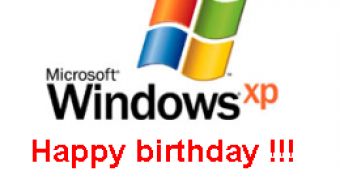It's been five years since Windows XP was launched on October 25, 2001, just three days before Bill Gates turned 46. This means that, while Windows XP will be turning five, Gates will see his 51 autumn in three days. For those that remember it was codenamed Whistler. There was little talk of its successor, Windows Vista at the time.
Microsoft was planning Blackcomb to succeed XP, and Vista was no less than an insignificant interim on the way there. XP stands for experience, as Windows XP was the successor of Windows 2000 and Me and also the first Microsoft operating system structured on the Windows NT kernel. Windows XP Home Edition, Professional, Media Center Edition, Tablet PC Edition, 64-bit Edition for IA-64 and the Professional x64 Edition have all marked stages in the evolution of the operating system.
To this day, it has dominated the operating system's market finding its way onto an estimated 86.80% of the world's PCs in 2006, according to OneStat.
It can be said from the get go that XP gave an illustration of what proves to be a rough ride. In December of the same year, Windows XP was plagued by the UPnP vulnerability. "Unchecked Buffer in Universal Plug and Play can Lead to System Compromise," reads Microsoft description of Security Bulletin MS01-059 released on December 20, 2001.
Windows XP's UPnP vulnerability had a crucial role in the further development of the operating system, by emphasizing the increased need for security. As a result of that vulnerability, the Redmond Company introduced the Trustworthy Computing initiative. And thereafter labored to create Windows XP Service Pack 2, codenamed Springboard.
Microsoft has officially killed support for Windows XP SP1 on October 10, 2006. The Windows XP Service Pack 2 codenamed Springboard, released on August 6, 2004 may live to see 2010 as Microsoft has recently postponed XP SP3 for the first half of 2008, and support is generally overread from 12 to 24 following the next service pack.

 14 DAY TRIAL //
14 DAY TRIAL //